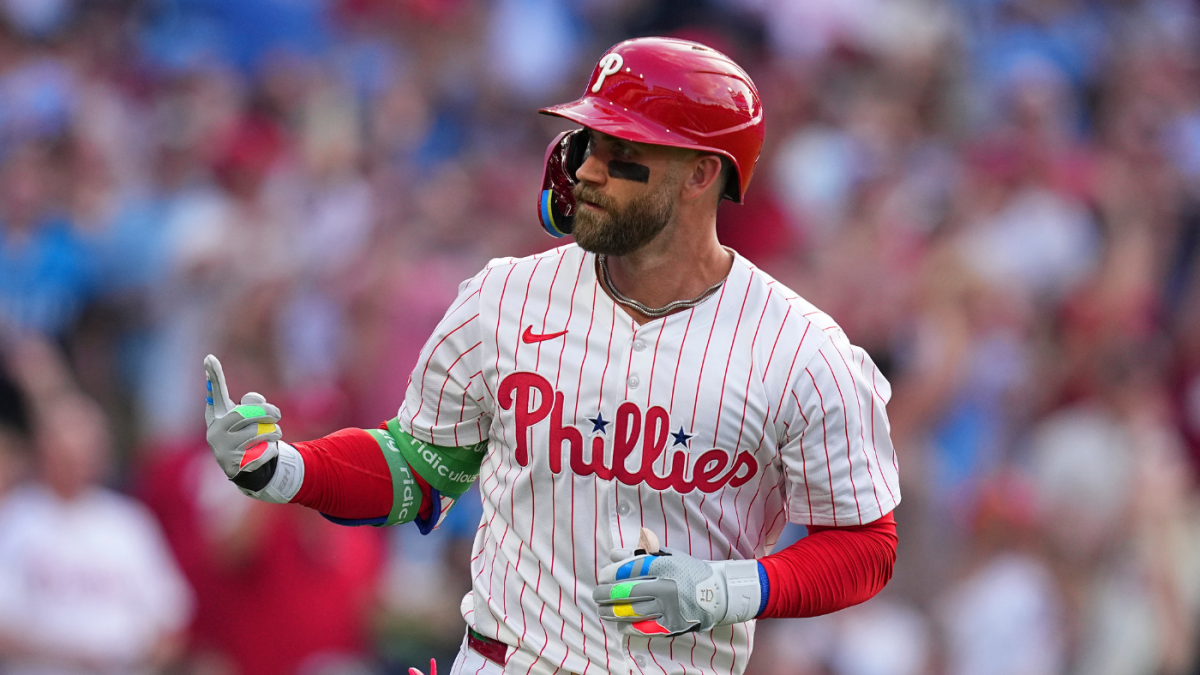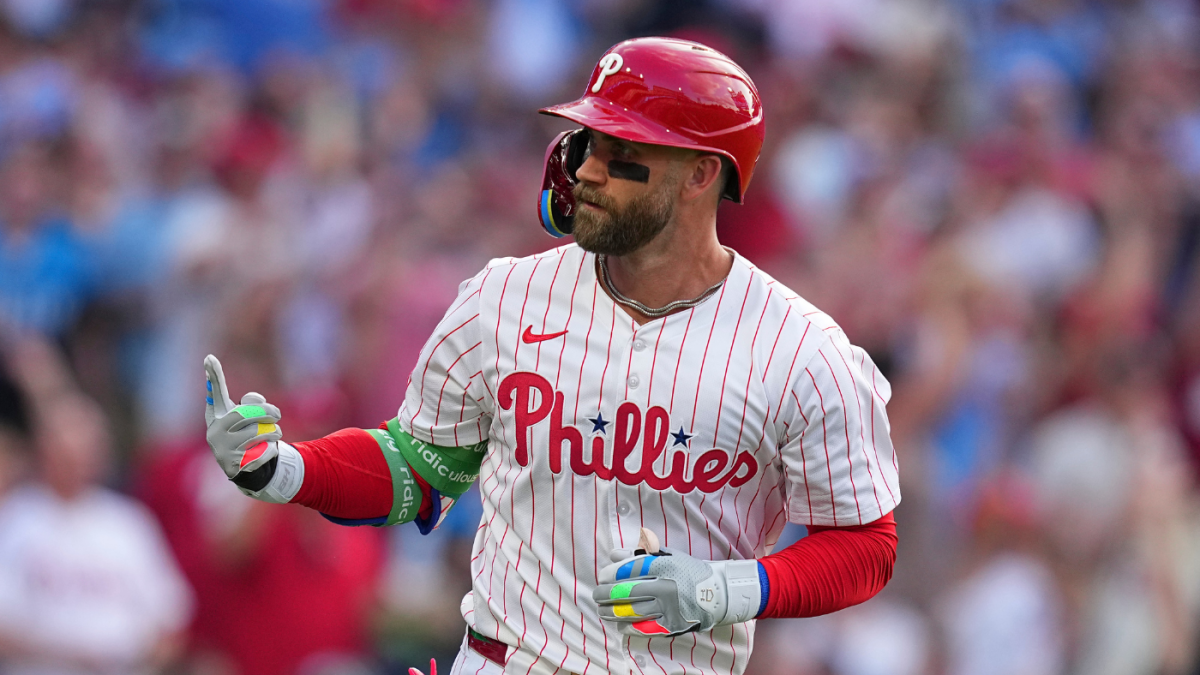The Harper-Manfred Confrontation: A Turning Point for MLB
Introduction: A Moment That Shook Baseball
The Philadelphia Phillies’ clubhouse, usually a sanctuary for players, became the stage for a dramatic confrontation that sent shockwaves through Major League Baseball. Bryce Harper, the team’s star outfielder and two-time MVP, reportedly told MLB Commissioner Rob Manfred to “get the f— out of our clubhouse” during a discussion about a potential salary cap. This wasn’t just a heated exchange; it was a defining moment that laid bare the deep-seated tensions between players and ownership. The incident has ignited a fierce debate about the future of labor relations in MLB, the economic structure of the sport, and the very soul of baseball.
The Salary Cap: A Battle Line Drawn
At the heart of the confrontation was the contentious issue of a salary cap. MLB owners have long advocated for a salary cap, arguing that it promotes competitive balance by preventing wealthier teams from monopolizing top talent. However, the MLB Players Association (MLBPA) has fiercely resisted this idea, viewing it as a direct threat to player earnings and free agency.
For players, a salary cap represents more than just a financial constraint; it symbolizes a power shift that could erode their ability to negotiate fair market value for their skills. The mere suggestion of a salary cap during Manfred’s meeting with the Phillies was enough to provoke Harper’s outburst, highlighting the raw nerves surrounding this issue. The players see the current system as already tilted in favor of ownership, with mechanisms like service time manipulation and limited guaranteed contracts already restricting their earnings. A salary cap would only exacerbate this imbalance, further entrenching the owners’ control over the game’s economic landscape.
Harper’s Defiance: A Leader Emerges
Bryce Harper’s confrontation with Manfred wasn’t an impulsive outburst; it was a calculated stand that positioned him as a potential future leader of the MLBPA. Harper, one of the highest-paid and most influential players in the league, has long been vocal about protecting players’ interests. His blunt dismissal of Manfred underscored the growing frustration among players who feel their economic rights are under siege.
Harper’s actions resonated with a broader sentiment within the player community. Many players feel disenfranchised by a system that allows owners to profit from rising revenues while suppressing player salaries. Harper’s defiance was a rejection of the status quo, a demand for fairness, and a warning that players are no longer willing to accept economic policies that prioritize ownership over their well-being. This moment could mark the beginning of a new era of player activism, where athletes take a more aggressive stance in defending their rights.
Manfred’s Dilemma: Caught in the Middle
Rob Manfred’s role as MLB commissioner is inherently fraught with conflict. He must balance the interests of the owners, who elected him, with the need to maintain a functional relationship with the players. Manfred’s clubhouse visits are intended to foster communication, but they often serve as a barometer for player sentiment. In the case of the Phillies, the mere mention of a salary cap—even without explicit advocacy—triggered Harper’s reaction, suggesting that Manfred’s efforts to build trust may be faltering.
Manfred’s challenge lies in navigating these murky waters without alienating either side. The owners want cost control and competitive balance, while the players want fair compensation and the freedom to maximize their earnings. Manfred must find a way to bridge this divide, or risk further erosion of trust between the league and its players. The confrontation with Harper serves as a stark reminder that the commissioner’s role is not just about managing the business of baseball but also about preserving the game’s integrity and the players’ faith in the system.
The Looming Labor War: A Ticking Time Bomb
The Harper-Manfred clash has raised alarm bells about the potential for another labor dispute when the current collective bargaining agreement (CBA) expires in 2026. The last CBA negotiations in 2021-2022 resulted in a lockout that delayed the start of the season, exposing deep divisions over economic issues like free agency, revenue sharing, and service time manipulation. If the two sides remain entrenched in their positions, another lockout seems inevitable.
A work stoppage would have far-reaching consequences. It would disrupt the season, damage the league’s reputation, and hurt the communities that rely on baseball for economic and cultural sustenance. For players, a lockout would mean lost wages and uncertainty about their futures. For owners, it would mean lost revenue and potential long-term damage to the sport’s brand. The stakes are high, and the Harper-Manfred confrontation has only intensified the urgency for both sides to find common ground before the next CBA negotiations begin.
Beyond the Money: The Soul of the Game
The debate over a salary cap and other economic issues ultimately boils down to a fundamental question: What kind of sport do we want baseball to be? Is it a business driven solely by profit maximization, or is it a game that prioritizes the players, the fans, and the integrity of competition?
For many, baseball is more than just a business; it’s a cultural institution, a source of community pride, and a symbol of American identity. The players are not just employees; they are the stars of the show, the athletes whose skills and dedication inspire millions of fans. A system that prioritizes cost control over player welfare risks alienating those fans and diminishing the essence of the game. Baseball’s unique appeal lies in its history, its traditions, and its ability to connect with people on an emotional level. If the league allows economic concerns to overshadow these values, it risks losing what makes the sport special.
Charting a New Course: The Path Forward
The Harper-Manfred confrontation represents a critical juncture for Major League Baseball. It’s a moment that demands introspection and a willingness to address the underlying issues fueling the growing tension between owners and players. Instead of resorting to adversarial tactics and entrenched positions, both sides need to engage in genuine dialogue, exploring creative solutions that address the economic concerns of the owners while ensuring players are fairly compensated.
This could involve alternative revenue-sharing models, implementing a salary floor to prevent teams from tanking, or finding innovative ways to incentivize player development and performance. The goal should be to create a system that is sustainable, equitable, and respectful of all stakeholders. The future of baseball depends on the ability of owners and players to find common ground and build a more collaborative and fair system. If they fail to do so, the sport risks alienating its fans, eroding its cultural significance, and jeopardizing its long-term prosperity.
A Wake-Up Call: The Echoes of Harper’s Words
Bryce Harper’s expletive-laden message to Rob Manfred resonated far beyond the Phillies’ clubhouse. It was a wake-up call, a stark reminder that the players are not simply passive participants in the sport’s economic ecosystem. They have a voice, a collective power, and a willingness to fight for what they believe is fair.
The incident should serve as a catalyst for change, prompting a renewed focus on building a more sustainable and equitable future for Major League Baseball. One that respects the contributions of all stakeholders and preserves the integrity of the game for generations to come. Only then can baseball truly reclaim its status as America’s pastime. The Harper-Manfred confrontation may have been a moment of tension, but it also presents an opportunity—a chance for the league to evolve, to adapt, and to ensure that the game remains a source of joy, inspiration, and unity for fans around the world.












